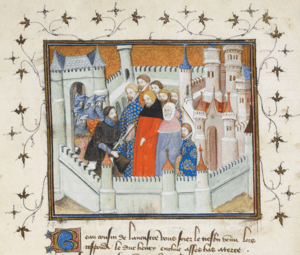Jean Creton facts for kids
Jean Creton lived and worked around 1386 to 1420. He was a French historian and poet from the Middle Ages. He worked as a personal assistant, or valet de chambre, for King Charles VI of France.
Creton is most famous for his chronicle (a historical story written in poetry). He wrote it after traveling to England in 1399. There, he saw King Richard II of England lose his throne. Creton visited England for fun and to see the country. He witnessed the events that led to King Richard II being removed from power by his cousin, Henry Bolingbroke. Creton's account is considered one of the most detailed and complete stories from that time.
Creton's Travels and the King's Downfall
Creton went to Ireland with King Richard's army in May 1399. Two months later, he was sent back to Wales with the Earl of Salisbury. Creton chose to join Salisbury's group because the Earl was known for being very brave and honorable.

In August, King Richard quickly returned from Ireland. He had heard that Bolingbroke, who was supposed to be in exile, had landed in England. Creton waited with the King at Conway Castle. There, he saw the Earl of Northumberland arrive, followed by Bolingbroke.
Creton and other less important members of the King's group were asked to leave the castle. Creton later admitted he was "more frightened than he had ever been in his life." But when Bolingbroke learned Creton and his friends were French, he spoke to them in their language. He promised them they would be safe.
One modern historian noted that Creton favored King Richard. After all, Richard had made sure Creton was well cared for. However, Creton also gave credit to Bolingbroke. He wrote about how Bolingbroke treated the captured King with respect. Creton described the meeting between Bolingbroke and Richard at Conway as very emotional. Both men were tearful and upset.
King Richard then gave himself up to Bolingbroke. Creton later managed to talk with Bolingbroke. He and his friend explained they were foreign visitors and "pleaded for their lives." Henry promised them safety. Creton said he felt "sad and sick at heart" and decided to return to France.
He might have seen Henry become King Henry IV. Creton later wrote that the crowds in London cheered for the new King as if he were Jesus entering the city. Creton was not happy about this.
The Metrical History
Creton's story of these events was written later, so he knew how things turned out. It has some small mistakes in dates or details, like many books from that time. But it still gives a believable account of this fast-moving period.
Creton explained that he wrote his story because the Earl of Salisbury asked him to. Salisbury had been captured with Richard and was executed the next year. Creton was able to write his account without trouble because he had returned to France. This meant he was "beyond the reach of Henry's heavy hand." He wrote it sometime between November 1401 and March 1402.
It was common for French writers to create stories about Richard's reign around this time. This was because Richard had married Isabella, the French King's daughter, in 1396.
Creton is one of the few writers from that time who believed Richard II was still alive after 1399. He might even be the only one. In his story, he wrote that when Richard's body was shown in St Paul's Cathedral in March 1400, he "certainly [did not] believe it was the old King." He thought it was Richard's chaplain, Richard Maudelyn. He said Maudelyn's face, size, height, and build were very similar to the King's.
Creton wrote to his own King about this. He said Richard's image came to his mind often, day and night. He later wrote that he cried "tears of sympathy" for Richard.
Believing Richard was still alive, Creton traveled to Scotland in April 1402. He hoped to meet the King there. However, he soon realized, "to his great disappointment," that the man he met was a fake. He then returned to France that same year to confirm Richard's death.
Creton himself reported that after a rebellion called the Epiphany Rising, the King who had lost his throne was "so vexed at heart by this evil news that from that time onwards he neither ate nor drank." Creton wrote that "thus, so they say, it came to pass that he died." He did not report this while traveling through England on his way back to France.
 | Laphonza Butler |
 | Daisy Bates |
 | Elizabeth Piper Ensley |

